Are you looking at letting your chickens in the garden? Here’s what you need to know about protecting both your chickens and your plants!
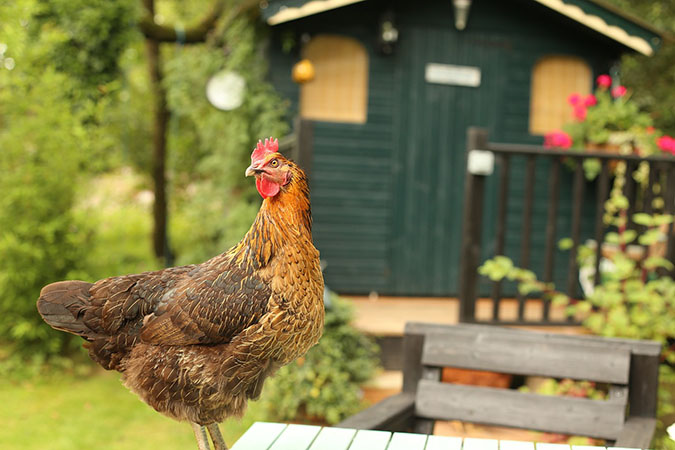
Chickens in the Garden: Strategies for Protecting Your Harvest
Although they may not be the first animal you think of when you picture a creature marauding in your vegetable patch, chickens love gardens. Because they’re such committed and enthusiastic foragers, gardens are in many ways a chicken’s paradise, full not only of tasty vegetables and weeds, but also a rich smorgasbord of protein in the form of worms, insects, and other bugs.
Because of this, some people tout chickens as a gardener’s best friend, weeding their plants and eliminating pests with very little work on the gardener’s part.
You May Also Enjoy:
“5 Excellent Reasons to Keep Backyard Chickens”
What some people swear by, though, just makes other people swear; some people will tell you that nothing destroys a garden like a flock of chickens, with their frequent dust baths and indiscriminate munching (chickens will eat most things when they are hungry).
In this article, we’ll look at both sides of the question, examining the pros and cons of letting chickens into your garden and going over some of the strategies chicken-owning gardeners use to get the full advantages of their chickens’ munching without having to deal with the negative aftermath.
Why Let Chickens in the Garden?
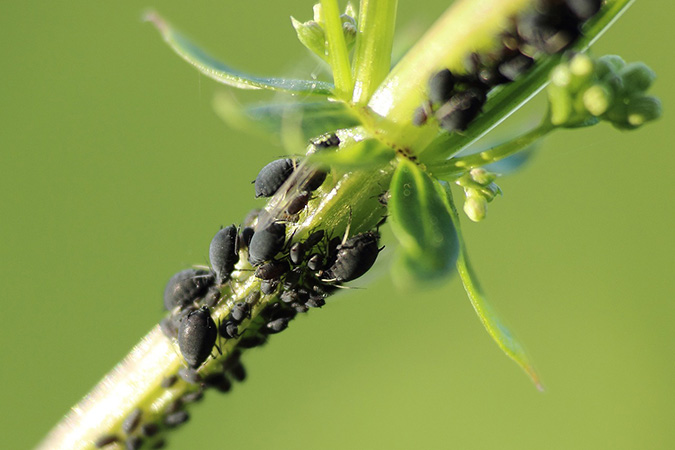
Probably the number one reason people let chickens in the garden is so they can serve as pest control, gobbling up caterpillars, aphids, flies, and other pesky creepy crawlies that like to cause trouble in a garden. This is certainly true, and your chickens will be thrilled you entrusted them with this responsibility.
Especially if you can’t let your birds out to free-range on the regular, an excursion into the garden can be a decent substitute for the many health benefits of foraging. Your birds will get more exercise, use their brains, be entertained, add extra protein to their diets, and also increase the variety in their diets, which will make them both happier and healthier. Birds that forage a lot and have more in their diet than just chicken feed will also produce healthier, tastier eggs and meat.
You May Also Enjoy:
“The 13 Best Chicken Breeds for Cold Climates”
“Indoor Fodder System: How to Grow Food in Small, Dark Places”
“Cheap, Cheep! 4 Novel Ways to Feed Chickens for (Almost) Free”
From the human side of things, letting your chickens in the garden will allow you to control pests in your garden without using toxic pesticides or unfamiliar chemicals.
Of course, nothing comes without a few downsides, and the main downside of chicken pest control is the birds’ indiscriminate palates. Your avian exterminators will be just as happy (if not more so) to eat a beneficial worm as a crop-destroying caterpillar. Unfortunately, if you’re planning to let your chickens in the garden, there’s not much you can do to prevent this.
Chickens and Gardens: 3 Downsides
Eating the Harvest
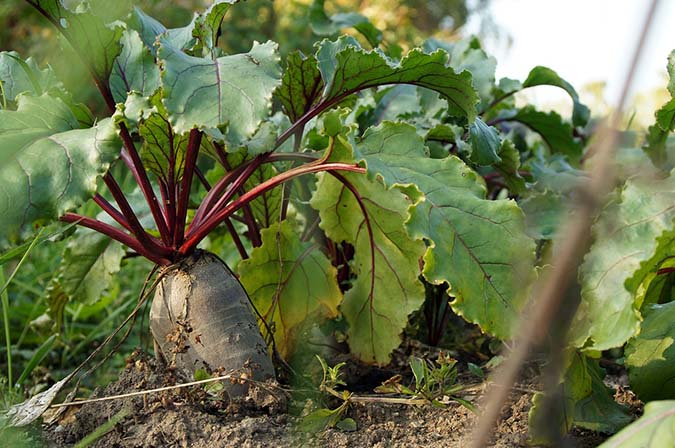
Most gardeners think no one enjoys the taste of their fresh vegetables as much as they do. While this may be true, a flock of chickens will certainly give them a run for their money. Chickens’ enthusiasm for munching on veggies is probably only matched by their proficiency in destroying them. Your chickens aren’t being malicious when they destroy your plants—just hungry—but that doesn’t make their presence any less devastating.
There are various measures gardeners can take to mitigate (though not eliminate) their chickens’ toll on their gardens, if they still want to let them inside.
- Setting up fencing, bird nets, and other barriers around your most desirable or delicate plants is one such measure.
- Another is simply growing “burner plants” that your chickens can have at as much as they like. This can mean either growing extras of plants you know your birds will like, or growing a separate plot your birds can be let into to enjoy.
Exposure to Toxic Plants
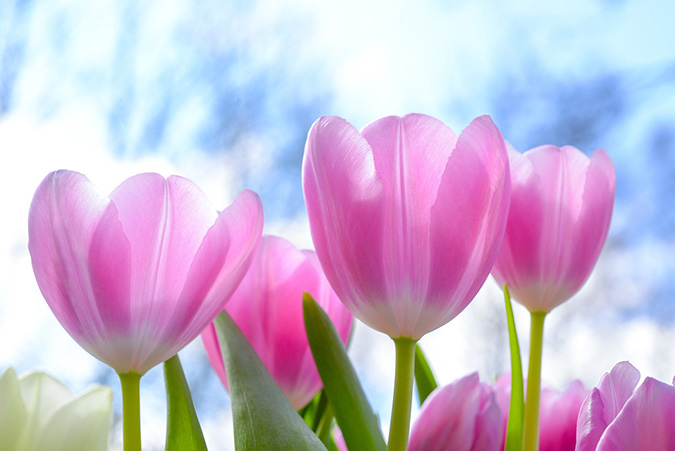
One thing to keep in mind when thinking about chickens and plants is that the danger can go both ways. Yes, chickens can tear up plants and destroy your harvest, but certain plants can also be poisonous and even deadly to your chickens.
Even common garden plants like rhubarb, rhododendron, tulips, buttercups, and potato sprouts can be toxic for chickens and should be avoided, or at least securely fenced off.
You May Also Enjoy:
“How to Grow Chicken Feed (The Easy Way)”
In addition, depending on where you live, there may be other native plants that could pose a threat to your birds; it’s a good idea to do some research on toxic weeds and indigenous plants and scour your yard and garden for them before you let your chickens out to roam.
Kicking Up Dust (Baths)
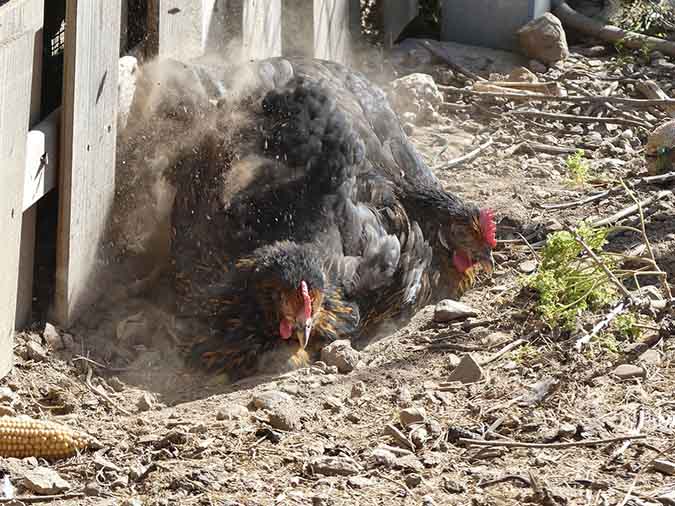
Some first-time chicken owners are surprised that their girls don’t need regular baths, but chickens take care of that themselves through the seemingly counterintuitive practice of dust bathing. In a dust bath, a hen finds herself some personal space and kicks up a big cloud of dirt and dust. These particles get into her feathers and help choke out red mites and other parasites, as well as just feeling good for the bird.
While chickens love them, dust baths can wreak havoc on a garden, because they clear large circles of dirt and dust, sometimes crushing plants or showering them in a choking cloud. Chickens will dust bathe anywhere, including your flower beds, so most people count dust baths as a reason not to let your flock into the garden.
Methods for Safeguarding Your Harvest
Fencing
Fencing is probably the best way to keep chickens out of your garden and can also, as a bonus, be a strong deterrent to other creatures and critters that want to make a meal of your carefully planted pumpkins and petunias.
Any fence that’s going to keep out a chicken should probably be at least six feet tall, although this can depend on which breeds you keep. Counterintuitively, smaller breeds like bantams may actually need higher fences, as they are more able and willing to fly up and over things than the heavier standard birds.
You should also be sure to bury any fencing six inches to a foot underground around your garden, as chickens are persistent diggers that will easily sneak under any shallower fencing.
If the only animals you want to keep out are chickens, standard chicken wire should be a fine option for your fence. If, however, you also want to keep out weasels, chipmunks, snakes, and other pests and predators, hardware mesh or hardware cloth is the way to go. This will likely be more expensive than chicken wire, but the smaller holes should keep any and all unwelcome guests out of your garden and away from your plants.
Sectioning
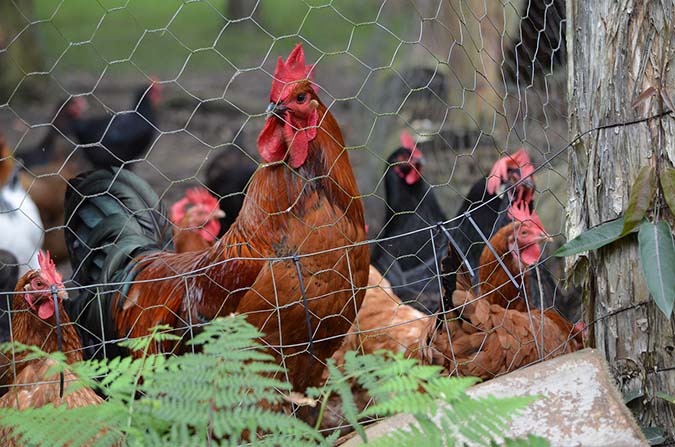
Sectioning your garden is one method for compromising with your chickens, allowing them to enjoy your garden as much as possible without sacrificing your harvest. In sectioning, you divide your garden into sections, grouping your plants based on when they flower, fruit, and ripen. Build fencing in between each of these sections, using hardware mesh or chicken wire.
This way, you can let your hens into one section at a time, right when your plants are least vulnerable to their beaks and claws. For most plants, this is after they reach full size but before they start bearing fruit.
You May Also Enjoy:
“Simple & Effective Worm Composting (VIDEO)”
Sectioning may not work for everyone. Particularly if you have a smaller garden, building different sections based on harvesting times and fencing them off probably won’t be worth all the work you put into it. However, it’s worth considering for people who want to get the pest-controlling and soil-churning benefits of chicken presence without quite as much crop destruction.
Should You Let Chickens in Your Garden?
In the end, the question of whether or not to let chickens in your garden comes down to each individual gardener’s personal priorities. For people with a serious bug problem who are highly skeptical of chemical pesticides, chickens may be the perfect solution. For those interested in maintaining an especially beautiful flower bed or vegetable plot, letting chickens into your perfectly planted rows may be the last thing you want.
One thing to remember, though, is that any decision you make now isn’t permanent. You can choose to let chickens into the garden for one season, and if it doesn’t work out, fence them out next year. As with most things in gardening and raising animals, it will take a process of trial and error to find the perfect balance for you, your family, your flock, and your flowers.
What Do You Think?
Do you let chickens in your garden? If so, how do you protect your plants? Let us know in the comments below!
____________________
The Grow Network is a participant in the Amazon Services LLC Associates Program, an affiliate program designed to provide a means for our team to earn fees for recommending our favorite products! We may earn a small commission, at no additional cost to you, should you purchase an item after clicking one of our links. Thanks for supporting TGN!
